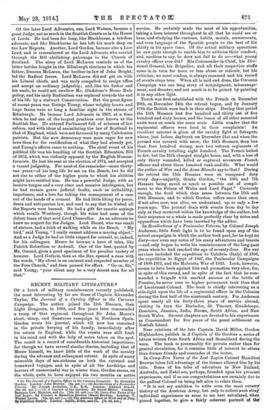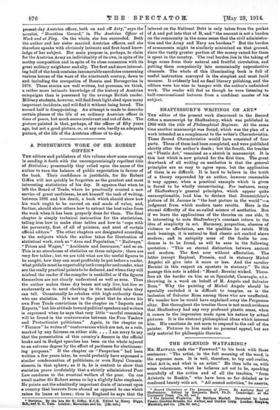RECENT MILITARY LITERATURE.* Oil a batch of military reminiscences recently
published, the most interesting by far are those of Captain Alexander Taylor, The Journal of a Cavalry Officer in the Corunna Campaign. The author joined the 15th Hussars, then Light Dragoons, in 1803, and five years later commanded a troop of that regiment throughout Sir John Moore's short, sharp, and disastrous campaign in Northern Spain. Gordon wrote his journal, which till now has remained in the private keeping of his family, immediately after his return to England, while the events were still fresh in his mind and with the help of notes taken on the spot. The result is a record of considerable historical importance, for though we have several similar diaries, including that of Moore himself, we know little of the work of the cavalry during the advance and subsequent retreat. In spite of many miserable days of sea-sickness on both the outward and homeward voyages, and in spite of all the hardships and horrors of unsuccessful war-in winter time, Gordon seems, on the whole, quite to have enjoyed his two months on active
• pi The Journal of a Omani Op, in the Corunna Campaign. By Alexander Gordon. London : John Murray. [8a. net.)----(2)Beeolieetions of a Peninsular 'eteran. By Joseph And.rson, C.B., L. London: Edward Arnold. gatpesdon nLeN.7.1 leeton Captain 4.[ the gr. no: y(41) David X! isr. London: t
Lost Legion. By Colonel A. TIsmIlton Browne Wean. Browne). London: T.
Werner Lawrie. [12a. 8d., net.1--,(6) The dustman Officer et and a play. fly Dorothea genre. Loudon Smith. Elder, and Co. [7a. 6d. net.] service. He certainly made the most of his opportunities; taking a keen interest throughout in all that he could see or hear, and studying the customs, habits, morals, amusements, and even language of the Spanish people to the best of his ability in his spare time. Of the actual military operationa he saw quite enough to enable him to criticize their cohducti and, needless to say, he does not fail to do so—what young cavalry officer ever did P His Commander-in-Chief, his Divio sional General, his Brigadier, and all their respective staffs come in in turn for more or less abuse or ridicule, but hid criticism, we must confess, is always reasoned and his record of events rings true. When all is said and done, the Coruna Campaign was one long story of misjudgment, mismanage• meat, and disaster, and not much is to be gained by painting it in any other light. Touch was first established with the French on December 20th, on December 24th the retreat began, and by January 17th the British were hack in their ships. During that period the 15th Hussars lost five hundred and thirty out of five hundred and sixty horses, and the losses of all other mounted units were on much the same scale. Little wonder that the regimental officers were loud in their complaints I An excellent account is given of the cavalry fight at Sahagunt where, just before daybreak on December 21st and when the ground was covered with snow, the 15th Hussars, then_ less than four hundred strong, met two veteran regiments of French cavalry totalling eight hundred. The French halted to fire, but the 15th charged straight home, and, with a loss of only thirty wounded, killed or captured sevehteen French officers and about three hundred rank-and-file. What would the author of War and the Anne Blanche say to that? During the retreat the 15th Hussars were oh rearguard duty every day—unjustly, thinks Gordon, "the 10th and 7th Hussars being saved as much as possible out of oompli- nient to the Prince of Wales and Lord Paget." Curiously enough, the feud which thus arose between the 15th and 10th Hussars, and to which Gordon refers more than once, if not alive now, was alive, we understand, up to only a few years ago. The journal deals with events from day to day only as they occurred within the knowledge of the author, but their sequence as a whole is made perfectly clear by notes and appendices which have been inserted by the editor.
In Recollections of a Peninsular Veteran, by Colonel Joseph Anderson, little fresh light is to be found upon any of the actual campaigns in which the author took part, for he kept no diary—nor even any notes of his many adventures and travelii —and only began to write his reminiscences of the long-past yearn when he bad reached the age of seventy-four. His war services included the expedition to Calabria (Italy) of 1803, the expedition to Egypt of 1807, the Peninsular Campaigns of 1808.1811, and the Maliratta. War of 1843. Luck, however, seems to have been against him and promotion very slow, for, in spite of this record, and in spite of the fact that he com- manded a brigade with marked success at the battle of Punniar, he never rose to higher permanent rank than that of Lieutenant-Colonel. The book is chiefly interesting as a side-light upon the life of a regimental officer in the Colonies during the first half of the nineteenth century. For Anderson spent nearly all his forty-three years of service abroad, visiting in turn the Barbados, St. Vincent, Guadeloupe, Dominica, Jamaica, India, Burma, South Africa, and New South Wales. Several chapters are devoted to his experiences as Commandant for five years of the penal settlement on Norfolk Island.
Near relations of -the late Captain David Miller, Gordon Highlanders, publish in A Captain of the Cordons a series of
letters written from South Africa and Somaliland during the wars. The book is presumably for private rather than for general circulation, for it contains little of interest to others than former friends and comrades of the writer.
In Camp-Fire Yarns of the Lost Legion Colonel Hamilton` Browne takes full advantage of the licence allowed him by hid
title. Some of his tales of adventure in New Zealand; Australia, and Natal are, perhaps, founded upon his personal experiences, and if so our congratulations are certainly due to the gallant Colonel on being left alive to relate them. "It is not my ambition to write even the most eariasti history of the Austrian Army, but only to collect mach stray! individual experiences as seem to me best calculated, when pieced 'together, to give a fairly coherent portrait of tiht? present-day Austrian officer, both on and off duty," says the novelist, "Dorothea Gerard," in The Austrian Officer at Work and at Play. On the whole, she has succeeded. Both the author and her sister married Austrian officers, and she therefore speaks with obviously intimate and first-hand know- ledge of her subject. Her main purpose is, perhaps, to claim for the Austrian Army an individuality of its own, in spite of its motley composition and in spite of its close connexion with its great military neighbour and ally. The first and more interest- ing half of the book contains innumerable anecdotes concerning various heroes of the wars of the nineteenth century, down to and including the occupation of Bosnia and Herzegovina in 1878. These stories are well written, but presume, we think, a rather more intimate knowledge of the history of Austrian campaigns than is possessed by the average British reader. Military students, however, will find fresh light shed upon many important incidents, and will find it without being bored. The second half is disappointing. An attempt is made to describe certain phases of the life of an ordinary Austrian officer in time of peace, but much seems irrelevant and out of date. The picture painted is that, perhaps, of the officer of fifty years ago, but not a good picture, or, at any rate, hardly an adequate picture, of the life of the Austrian officer of to-day.















































 Previous page
Previous page